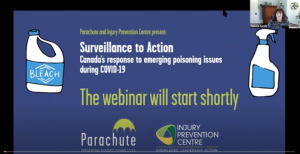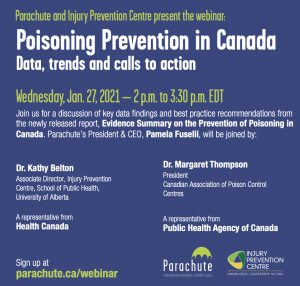Collection at a glance:
Webinars
-
Carbon monoxide poisoning: Trends and responses in Canada (2023)
Carbon monoxide (CO), often called “the silent killer”, is a leading cause of unintentional poisoning deaths in Canada and North America. Hosted by Stephanie Cowle from Parachute, this webinar will explore CO poisoning trends and responses from multiple perspectives, including poison centre responses to emergency weather events, a case study examining CO health literacy among homeowners and gaps relating to CO legislation in Canada. The speakers will cover key messages for preventing future occurrences, as well as opportunities for collaboration and action. A Q&A sessison will follow the presentations.
-
Trends and responses to unintentional pediatric analgesic poisonings (2023)
Medications are the leading cause of poisoning in Canada. Medications that relieve pain, known as analgesics, are the No. 1 substance Canada’s poison centres receive calls about. Hosted by Patti Stark from the Injury Prevention Centre in Alberta and Pamela Fuselli from Parachute, this webinar will feature panellists from the Ontario Poison Centre, Atlantic Canada Poison Centre, Centre antipoison due Québec and the Institute for Safe Medication Practices Canada.
The webinar will provide an overview of trends, data and responses to unintentional analgesic poisonings among pediatric populations. Key messages for parents and caregivers will be highlighted as well as opportunities for collaboration and action.
Learning objectives will include:
- Understanding the burden and trend of unintentional analgesic related poisonings among pediatric populations in Canada
- Key messages for parents and caregivers on how to prevent analgesic poisonings
- Identifying opportunities for engaging stakeholders, such as pharmacists, in raising awareness and preventing analgesic poisonings
Panellists include:
- Jacqueline Burke, Certified Specialist in Poison Information, Ontario Poison Centre
- Audrée Elliot, Pharmacist, Centre antipoison du Québec (CAPQ)
- Laurie Mosher, Certified Specialist in Poison Information, Atlantic Canada Poison Centre
- Alice Watt, Senior Medication Safety Specialist, Institute for Safe Medication Practices Canada (ISMP Canada)
-
Trends in Canada’s drug supply, polysubstance use and unintentional drug poisonings (2023)
Unintentional drug poisonings remain one of Canada’s most devastating public health issues. Hosted by Parachute and featuring presentations from Emily Biggar, Chealsea De Moor and Doris Payer from the Canadian Centre for Substance Use and Addiction, this webinar will provide an overview of emerging trends in Canada’s unregulated drug supply, polysubstance use and harms related to unintentional drug poisonings. Implications for reducing harms to people who use drugs and practising non-stigmatizing language around substance use will be highlighted.
Panelists
Emily Biggar, MPH
Research and Policy Analyst
Canadian Centre on Substance Use and Addiction (CCSA)Chealsea De Moor, MA
Knowledge Broker
Canadian Centre on Substance Use and Addiction (CCSA)Doris Payer, PhD
Senior Knowledge Broker
Canadian Centre on Substance Use and Addiction (CCSA) -
The brave new world of content creation: Connecting with our audiences in a saturated media environment (2022)
The average American sees up to 10,000 advertisements, brands, messages or more a day. Fortune 500 companies spend billions of dollars to get their messages heard. So, how can a non-profit with little to no budget break through and connect to their audiences, supporters and the public?
This webinar, hosted by Laurie Mosher, a Specialist in Poison Information at the Atlantic Canada Poison Centre, will feature a presentation from Mike McCormick from the Florida Poison Information Center on how organizations can be more effective in their health messaging.
Emotional content creation is the key for us to share our important healthcare messages. Sharing our story in a disciplined, disruptive and distinct manner is the key to getting above the noise. The fundamentals of producing clear, concise, clean and contextual messages are more important than the dissemination medium. This session will focus on a method of content creation to cut through the clutter.
-
Cannabis & edibles poison prevention: Exploring parent attitudes and behaviours (2022)
Since the legalization and regulation of cannabis in 2018 and edible cannabis products in 2019, unintentional cannabis exposures in young children have increased. This webinar, hosted by Parachute, will explore key data findings from a 2021 survey of parents/caregivers regarding their cannabis use, storage habits and perceptions of unintentional cannabis exposure risk for young children.
The webinar will also provide an in-depth look at child cannabis poisoning trends and key issues, poison centre information and data from across Canada and recommended actions for cannabis poison prevention, as well as priorities for cannabis poison surveillance and prevention.
SPEAKERS
Stephanie Cowle
Director of Knowledge Translation, ParachuteMargaret Thompson
Medical Director, Ontario Poison CentreJacqueline Burke
Certified Specialist in Poison Information
Ontario Poison CentreAndrea Taylor
Acting Senior Policy Analyst, Health Canada -
Exploring illegal cannabis packaging, products and sellers (2022)
The legalization of cannabis in 2018 and cannabis edibles in 2019 was accompanied by regulation on cannabis production, distribution and packaging. However, illicit cannabis products continue to make their way into the Canadian market and consumers’ homes. Illegal cannabis products are often packaged to look like popular brands of candies, snacks or other food products or have more than the allowable limit of THC per package. These products pose a risk to Canadians, particularly young children who may mistakenly consume them.
This webinar, hosted by Parachute, will review the legal requirements for cannabis products, packaging and sellers in Canada and explore the impact of illegal products. Featuring presentations from the RCMP and IWK Poison Centre, the webinar will provide an in-depth look at the history and rationale of packaging requirements as well as the response of poison centres to illegal cannabis products.
-
Notable poisoning trends: what you need to know (2022)
This webinar covered three notable trends in poisoning: medication-related poisonings; youth self-harm poisoning hospitalizations; and essential oils-related poisonings and complaints.
-
Poison Prevention – It’s Not Just For Poison Prevention Week (2021)
The “Poison Prevention – It’s Not Just For Poison Prevention Week” webinar, hosted by Parachute and the Injury Prevention Centre, will bring together partners from across Canada to share their activities for Poison Prevention Week 2021 and ideas for how to continue to promote poison prevention to parents, caregivers and others, year-round.
-
Surveillance to Action: Canada’s response to emerging poisoning issues during COVID-19 (2021)

This 90-minute webinar hosted by Parachute and the Injury Prevention Centre on Feb. 26, 2021, focused on how The COVID-19 pandemic has introduced new poison prevention challenges, with more time spent at home and the introduction of more household cleaners, bleaches and hand sanitizers than ever before. The 11 panelists, including several from Health Canada, addressed how poison-related issues are reported and addressed in Canada discussed the timely detection of dangerous products, the development of public advisories and outreach, the process of stop sales and recalling non-compliant products, developing new policy, and the value of information sharing and collaboration in poison prevention.
-
Poisoning Prevention in Canada: Data, trends and calls to action (2021)

This January 2021 webinar features a discussion of key data findings and best practice recommendations from the Evidence Summary on the Prevention of Poisoning in Canada. Featuring Parachute President and CEO Pamela Fuselli, Dr. Kathy Belton of the Injury Prevention Centre, Alberta, Dr, Margaret Thompson, President of the Canadian Association of Poison Centres, and representatives from Health Canada and the Public Health Agency of Canada.